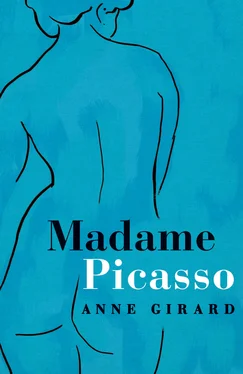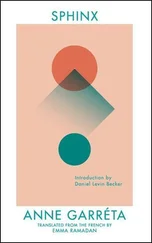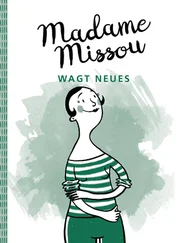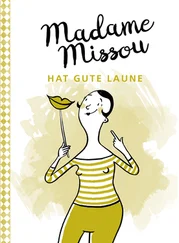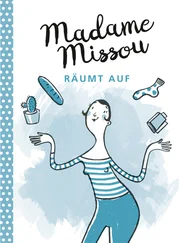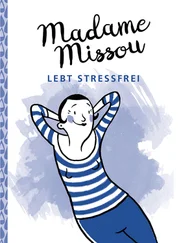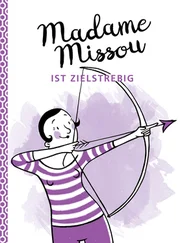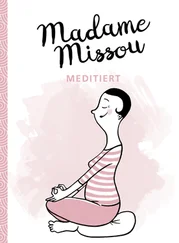“When I slip out of the dressing room, follow me a moment later,” he said matter-of-factly in a way that made it beyond her power to object. She felt herself grow excited by the danger of his request.
It seemed only a moment later that Picasso was clutching her hand tightly and they were running together like children through the lamplit streets up toward the foot of Montmartre, the glorious vista of Paris and all of the city lights shining brightly behind them.
Laughing and holding hands, they trudged up the many steep steps of the rue Foyatier. Then they hurried across the rue Lepic and down the cobblestoned rue Ravignan toward the artist’s enclave at the Bateau-Lavoir.
Picasso squeezed Eva’s hand when they finally arrived at the ramshackle building in the center of a sloping square, lush with rustling chestnut trees. She knew this shabby old place, with its sagging roof full of filthy glass skylights, was a haven to impoverished painters, models and thieves. She and Louis had passed by it many times on their way to Au Lapin Agile or la Maison Rose. She had found it distinctive, too, and even a little charming, because it seemed constantly peppered with pigeons, stray cats and fat gold leaves.
There was usually a crowd of Spaniards gathered there, sitting on overturned crates and stools, one of them invariably strumming out a tune on a battered old guitar. But tonight they were alone. Only the gaslight from the streetlamps kept them company.
“You are stunning,” Picasso said.
It took all of her effort not to squirm childishly beneath his potent stare. He smelled faintly of pipe tobacco, wine and the distinctive scent of his maleness. The combination was strangely intoxicating, and Eva could feel that her throat had gone dry. He looked at her with a rich expression of expectation. Yet it was not rude or arrogant. She felt the inevitability in it.
“You do know how to flatter a girl,” she said. Her knees were impossibly weak. “More men in Paris really should learn how to do that.”
“It is a thoroughly Spanish trait, mademoiselle, I assure you,” he said as he encircled her with his arms. Then he pulled her back with him against the crumbling wall of the house, pressing himself up against her. Eva gasped as he covered her mouth with his.
A soft moan escaped his lips and Eva squeezed her eyes shut. She was fighting a dizziness that was engulfing her as they kissed, as she felt his rigid body against her wanting more. Her defenses crumbled and a moment later he was clutching her hand tightly in his own again and leading her inside the old house.
Someone was cooking in one of the studios and the strong aroma of spices was sensual and inviting. The floorboards and stairs creaked beneath their footsteps as they made their way through sounds of guitar music and chatter behind closed doors. All of it—this odd place, her innocence and desire—mixed together in her mind along with the excitement and fear of something she had never done before, disarming her. It was then, as if he sensed it, that he squeezed her hand more tightly, warm, powerful and commanding. His touch reassured her and eased the fear. Eva let him lead her the rest of the way. She wanted to be here, she reminded herself. She had come away willingly.
Picasso’s studio was at the end of a corridor. He turned a doorknob and pressed back the door, which made a long, low squeal. Then he held out his arm with a gallant flourish, issuing her inside.
Eva took two steps and was stopped by the profusion of work that lay scattered before her. The room, with giant windows and peeling plaster walls, was littered with canvases, large and small ones, hanging in a riotous jumble on the walls. The color, the light and the clutter, all of it together, made her gasp. Her hand flew to her lips but not in time to stifle the sound of surprise. Picasso bit back another smile, which he meant for her to see.
“Bienvenida,” he said as he closed the door behind them.
The odor of paint and turpentine in the small space was bitingly strong.
Picasso’s smudged windows, full of badly painted panes, dominated the space and ushered in the silver light from a shimmering full moon. He lit an oil lamp on a table in the center of the room, illuminating the many canvases with mellow light.
Some of the works hung crookedly, some were straight—all vying for a cramped bit of space. Other canvases were propped against the walls, three-and four-deep; they were stacked on tables on top of loose pages filled with sketches. More were tossed onto the studio floor like litter, along with paint boxes, jars, squashed tubes of paint and rags. The sheer volume of work was astonishing. It seemed to Eva like a great creative explosion.
But there were finer details of the place that came into focus once Eva allowed herself to breathe in and see it all. There was a small wooden animal cage on the floor, and beside it were two roughly sculpted stone heads, perched on wooden pedestals, remarkable to her for how antiquarian they appeared. The only real piece of furniture, besides an easel, was a small iron-frame bed covered over with a pretty apple-green quilt embroidered with red roses and red fringe.
“You...live here?” she asked. She turned back to him and their eyes met.
“Once. But not any longer. Yet, it is still the place where my soul resides.”
Not quite knowing what he meant by that—or how to react to any of this evening—Eva picked up a sketch that was lying on the table. It was boldly erotic—two women open to an animal-like male figure with a dark forelock of hair. She had never seen anything so carnal and she felt embarrassed. Picasso looked at her unfazed.
“It is a satyr and his nymphs,” he said.
Eva glanced up at him, pressing back her naive shock. She could feel the hesitation in her own expression. “Is the satyr supposed to be...you?”
“If you wish.”
“I don’t understand.”
Picasso shrugged and flashed his disarmingly sheepish smile. It was a response of equivocation. “I see life differently,” he said with a charmingly casual simplicity.
“Clearly, you do.”
Oh, dear, she should not be here, she thought, no matter what she had told herself earlier. This place was cold and plain and it felt wildly dangerous. Eva was suddenly terrified of her own innocence—of displeasing him. But there must be a first time for everyone, her conscience silently argued, and her heart raced. Her first time, here now with a great artist, would be something she would never forget. She trembled and tried her best to look mature. She felt herself being drawn into him so powerfully that she couldn’t run even if she wanted to.
Eva pushed away the thoughts competing in her mind. Trying to buy time to process the moment, she focused on a stack of large canvases propped on the floor beneath the window. The collection of paintings had been done in rich shades of dark blues and grays, and the images at the center of each were absolutely haunting, gaunt, bereft characters. They were nothing at all like the charismatic, carefree man who had brought her here. Rather, they were people who all exemplified some dreadfully sad tale, and Eva could feel the human tragedy in each of them.
Eva knew nothing about art. But she knew what moved her. These were powerful images, all so raw, and very different from the Cubist works at the exhibition of a sort she was told he, too, painted. Her body reacted to the drama in these before her mind could. What did it mean that he could create in two such different styles? Was there a story? Her head throbbed with a jumble of questions and emotions and it made her feel insecure to wonder about them. Clearly there was more to Picasso than what he had allowed her so far to see.
Next in the stack of canvases was a portrait of a young, dark-haired man, clothed all in black with a glowing backdrop. His pale face, looking directly at the viewer, black eyes wide and plaintive, was rendered almost cadaverously white by the intense blue of the background. The face had a poignant sadness that drew her almost as profoundly as the women had.
Читать дальше
